Jonathan Lack's Top 10 Films of 2019

2019 has been one of the greatest years for film in my lifetime, and an incredible end to the decade in cinema. We’ll be talking at great length about the best films of the 2010s on this week’s Weekly Stuff Podcast, where I’ll be presenting my Top 50 films of the Decade. But for today, I’m honing in on what a special year in film 2019 turned out to be; a year of diverse voices churning out great, challenging, and unique films around every corner; a year where well-established masters turned in astonishing visions alongside wildly talented first- or second-time directors; and a year where movies continually found incredibly deep wells of humanity as the world around us seemed increasingly devoid of it.
My process for creating this list was not as rigorous as it’s been in the past, with no accompanying screener binge. It didn’t feel necessary, as I went to the movies a lot more in 2019 than I have in recent years, motivated in part by what a bounty of promising options were laid out before me. I didn’t see everything I wanted to – no individual can – and there are certainly a few films I never got around to (including The Lighthouse, Marriage Story, and 1917) that I feel pretty sure I would have loved. But so it goes, and the list I have before me is so strong it’s hard to feel much regret. Every one of the films in my Top 5 this year is a genuine all-timer, an instant classic I think we’ll be processing for many years to come. I don’t think I’ve ever had such a densely concentrated set of greatness on a year-end Top 10 – and the films in the ‘bottom’ 5 are, of course, no slouch. Nor are the many Honorable Mentions we’ll get to at the end, a list of 20 additional titles I loved and/or found in some way particularly compelling this year, arranged alphabetically to create an even wider picture of this great year in film.
So without further ado, continue reading after the jump for The Top Ten Films of 2019…
10. A Beautiful Day in the Neighborhood
Directed by Marielle Heller

Last year, Morgan Neville’s documentary Won’t You Be My Neighbor? brought Mr. Rogers back into the spotlight, and many a tear to a viewer’s eyes. It was exactly what a documentary account of Fred Rogers’ life should be, and walking out, it was hard to imagine Hollywood improving on what Neville accomplished with a dramatized film. Marielle Heller’s A Beautiful Day in the Neighborhood succeeds, then, because it isn’t a biopic. In fact, it really isn’t a film about Mr. Rogers at all, but a parable about fatherhood, anger, and forgiveness, told through the prism of Fred Rogers’ worldview and teachings. And it’s so beautifully done that it is liable to produce just as many tears as the documentary. Tom Hanks understandably gets most of the attention in discussions of the film – while he cannot melt into the role given his stature, it’s that very same stature that allows us to trust and believe in him to the degree needed to tell this story – but what Matthew Rhys displays here is perhaps even more astonishing, a performance of raw, human pathos without which there is no story to tell. The story, about a journalist sent to profile Mr. Rogers whose unhealed wounds over his father’s childhood abandonment continue to fester in adulthood, is one the real Mr. Rogers, were he here, would no doubt approve of: A tale of learning to accept one’s emotions, to truly feel one’s feelings, not because the world will suddenly be full of light on the other side, but because, as Mr. Rogers said, “Anything that's human is mentionable, and anything that is mentionable can be more manageable.” It’s hard to imagine many more necessary messages for the times in which we live than that one, and the catharsis experienced while watching Heller’s film is profound.
A Beautiful Day in the Neighborhood is now playing in theatres.
9. Us
Directed by Jordan Peele
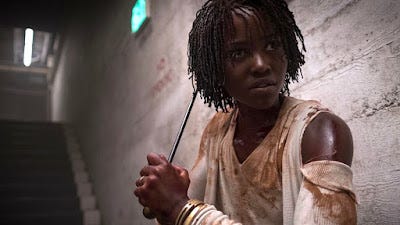
Going into Us, we already knew Jordan Peele was a uniquely gifted writer and promisingly sharp filmmaker, as his 2017 feature debut Get Out demonstrated a startling, subversive command of film history, cultural criticism, and both horror and comedy chops. It wasn’t surprising he had plenty more left in the tank for his second film, but I was still blown away by just what a ridiculously skillful piece of filmmaking Us turned out to be, with editing, cinematography, and especially music – original score and incidental – working in utter jaw-dropping harmony from top to bottom. Less overtly topical (though no less culturally and historically engaged) than Get Out, Us is, once again, a great and utterly original piece of writing, but it truly is the craft where Peele has taken a leap forward here, as Us contains numerous sequences – the prologue at a Santa Cruz beach, an expertly choreographed climactic fight sequence between two Lupita Nyong’o’s, and a home invasion that will forever change your relationship to The Beach Boys’ Good Vibrations – that rank among the best pieces of cinematic construction this decade, woven into a sumptuous whole that is stylistically overwhelming, full of ambiguities, and, it must be said, Freudian as hell. Throw in one (two?) of the most powerful performance(s) of the year by Nyong’o and a tremendous score by Michael Abels, and Us is a film I could have kept watching for two or three more hours. What a thrill to know we’re only at the beginning of wherever Jordan Peele’s career is sure to take us.
Us is now available on DVD, Blu-ray, and digital platforms.
8. John Wick: Chapter 3 – Parabellum
Directed by Chad Stahelski

The third and greatest installment in the incredible John Wick series, Parabellum is silly, over the top, and resolutely unhinged – and it is also one of the best and most accomplished pieces of visual art American cinema has produced in years. And ‘art’ is indeed the word to use here, because the visual, editorial, and technical mastery on display here is simply sublime, a symphony of motion and color and, especially, choreography. All the John Wick films, and Chapter 3 in particular, are near-peerless feats of bodies in finely-orchestrated motion; to find better examples, you’d have to go back in time to the days of Buster Keaton and the silent geniuses, or to the Hong Kong action boom of the 70s and 80s with geniuses like Jackie Chan. For contemporary American cinema, there’s simply nothing else like it, and that director Chad Stahelski, star Keanu Reeves, and one of the best and most dedicated stunt teams in the industry (make it a category, Oscars) have somehow improved exponentially on their brutal action balleticism each time out is just astonishing. Every single action sequence in Parabellum is one for the history books, a series of incredibly, creatively, impeccably choreographed, captured, and edited set pieces, brought to life amidst stunning and unforgettable production design with a knockout sense of color, and tied together by the best-paced, most self-assured script in the series so far, one that continues to lend the action extra weight by building such a goofy, earnest, increasingly original world around its title character. Action films this good don’t grow on trees – Parabellum is second only to Mad Max Fury Road as the genre’s best English-language entry of the decade – and franchises like John Wick are practically unheard of. Chapter 4 can’t come soon enough.
John Wick: Chapter 3 – Parabellum is now available on DVD, Blu-ray, and digital platforms.
7. Booksmart
Directed by Olivia Wilde
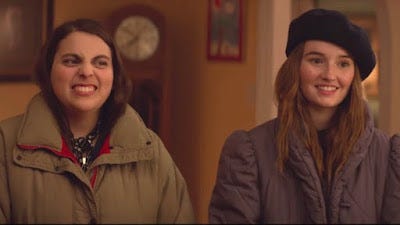
Olivia Wilde’s directorial debut, Booksmart is easily one of the best high school comedies I’ve ever seen – and certainly the most authentic to today’s world, an intensely present-tense, of-the-moment work that finds immense universality in its intense specificity. The depth the film gives its characters and the space between them, how smartly and sensitively it challenges assumptions and stereotypes – it’s a masterful screenplay (credited to Emily Halpern, Sarah Haskins, Susanna Fogel, and Katie Silberman) elevated by laser-sharp direction from Wilde, a deeply synesthetic use of music, and a tremendous cast. Beanie Feldstein is an absolute comic powerhouse, and Kaitlyn Dever’s work, which takes the film to its heaviest and most emotional places, is nothing short of Oscar worthy. And one can’t say enough good things about Billie Lourd, bouncing off the walls like a live-action cartoon in a truly great lunatic performance. Here’s how I know Wilde and company got this one 100% right: As I walked out the theatre, feeling like I was floating slightly from the jolt of brazen, passionate originality I’d just seen, I could hear a few retirees behind me complaining that the film was much too vulgar, and that they didn’t want to see young women ‘acting that way.’ Hard to think of a higher stamp of approval for getting a high school comedy right in 2019.
Booksmart is now available on DVD, Blu-ray, and digital platforms.
6. Uncut Gems
Directed by Josh and Benny Safdie

Uncut Gems feels like co-writers/directors Josh and Benny Safdie looked at every great paranoid and/or dark American masterwork of the 1970s – Taxi Driver, The Parallax View, Network, Klute, Nashville, what have you – and said “You know what? None of these twist the knife in hard enough. Let’s see some real fuckin’ blood.” And so we get this sustained two-hour heart attack of a film, where Adam Sandler – in a performance so exceptional and so unique to his particular persona and skill set that it is literally impossible to imagine any of this working without him – plays a jeweler, gambler, and adrenaline junky who starts the film several yards out over his skis with debts and loansharks, and keeps digging himself a hole of such staggering audacity it would take nothing short of a miracle to see his way to the other side. With a whip-smart screenplay by the Safdies and Ronald Bronstein, a singularly pulse-pounding score by Daniel Lopatin, and absolutely killer photography by the great Darius Khondji, who ladles every frame with color, texture, sleaze, and a nervous, positively manic energy, it’s the most balls-to-the-wall, ruthlessly exciting movie I’ve seen in years. The last half hour, where that much-needed miracle becomes tantalizingly palpable, may be the hardest my chest has ever pounded in a movie theatre. The Safdie Brothers are insane, and God bless them for it.
Uncut Gems is now playing in wide theatrical release.
5. The Irishman
Directed by Martin Scorsese
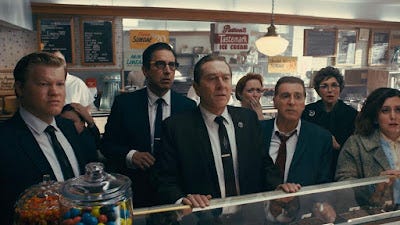
There are exceptionally few directors who have stayed so essential for so long as Martin Scorsese, and if The Irishman isn’t his greatest film, it may be the clearest and most all-encompassing testament to his unique cinematic prowess. An absolute feast of a movie, so rich in humor and pathos and big, challenging ideas, Scorsese may have crafted the most deeply human American gangster movie this side of The Godfather. I hope Scorsese has many years and many more movies left in him, but The Irishman feels like about as conscious a career summation as any filmmaker has ever crafted. It’s a conscious reflection on just about everything the director has ever questioned, explored, or depicted in film, distilled into 3.5 hours – effortless to sit through thanks in large part to the peerless talents of editor Thelma Schoonmaker – and shot through with a sense of elegy so profound it frequently took my breath away. So did the performances. Seeing Joe Pesci on screen again, fully engaged in a mournful, stoic masterclass of a performance, is an absolute gift. Watching Al Pacino give his best work since Heat – a whirling dervish of a performance channeled in the exact right direction – is a delectable treat. And though it may be heresy to say so, I think this might be Robert de Niro’s best work on film, a performance that shows off every talent he’s ever exhibited on film, but with an additional register of pain, confusion, and regret that can only come with age and wisdom. It is a truly titanic performance at the heart of a film that pulses with life, and whenever these aging artists finally do pass on, one can bet The Irishman will be prominent in discussing, understanding, and celebrating their incredible work.
The Irishman is now streaming on Netflix.
4. Little Women
Directed by Greta Gerwig

It’s interesting to see this film wind up right next to The Irishman on the list, because the two films make for a pretty compelling, if unexpected, pairing: Both are memory pieces, weaving two timelines from a single life into one forward-moving narrative, one framed by a man at the end of his life, one through a woman on the precipice of hers. One is an intensely, critically reflexive masculine film, the other proudly, richly feminine. And both are masterworks, one by a legendary filmmaker with more miles behind him than ahead, one by a relatively new director one can only expect decades of great cinematic storytelling stretched out before her.
Of course, if you saw Greta Gerwig’s first directorial effort, 2017’s stupendous Lady Bird, the remarkable creative success of Little Women should come as little surprise. Like with Jordan Peele and Us, though, the joy of seeing a great artist deepen and expand their craft before our eyes is a real and profound treasure. Here, Gerwig has taken the classic Louisa May Alcott novel, exploded its component parts, and rearranged the massive tome into a cinematic experience so rich in detail, character, and life it’s astonishing two hours can contain it. Each of the four March sisters – Beth (Elizabeth Scanlen), Amy (Florence Pugh, in her third great performance of the year), Meg (Emma Watson, American accent sturdier than ever), and protagonist Jo (Saoirse Ronan, once again proving herself one of the great actors alive, let alone of her generation) – is a fully formed, richly defined character, and the supporting cast is an embarrassment of riches, with what might be the most moving work in Chris Cooper’s career serving as a particular standout. The lush, painterly cinematography by Yorick Le Saux may be the most quietly astonishing series of images I’ve seen play out on screen this year, and Alexandre Desplat’s beautiful, classically-styled score is a wonderful departure for the great composer. All told, Gerwig has crafted perhaps the great film about the simultaneous sadness and possibility that comes from transitioning from childhood to adulthood, a movie about those most powerful memories we can never return to, but which propel every step we make as we enter into the world. Filmmakers spend their whole lives working to virtuoso masterworks like Little Women; Greta Gerwig arrived here on her second time behind the camera. What luck we have to watch this talent flourish.
Little Women is now playing in wide theatrical release.
3. A Hidden Life
Directed by Terrence Malick
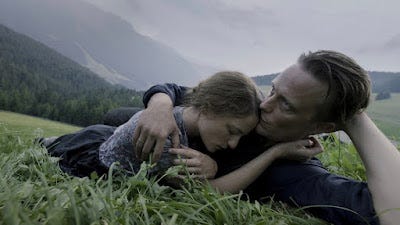
Terrence Malick is, to me, the greatest living American director, and A Hidden Life is one of his most awe-inspiring works, a deeply, beautifully challenging full-throated masterpiece that belongs in the pantheon of great films about crises of conscience and faith alongside Carl Th. Dreyer’s The Passion of Joan of Arc and Krzysztof Kieslowski’s Dekalogcycle. In telling the story of Austrian conscientious objector Franz Jägerstätter, who refused to swear an oath to Hitler in WWII and was executed, Malick has created a work of immense philosophical, thematic, and existential ambition, but also of passionate humility. It is about the grace, suffering, freedom, and doubt inherent in asking the most difficult questions life has to offer – not in getting answers, which may be impossible to attain. Working for the first time in a fully digital format with cinematography Jörd Widmer, A Hidden Life is a profoundly sensory experience even above and beyond what we have come to expect of Malick, with James Newton Howard contributing the best and most relentlessly emotive musical score of 2019. I spent much of the film on the verge of tears, for it is a work built to make us contemplate and appreciate that our senses, our emotions, our consciences are both immense burdens and profound gifts. The beauty and the agony of life on earth rests in the contradiction. And when one walks outside afterwards, the sight of the sun, and the smell of the air, and the sight of trees and snow and sky all feel more palpably real and beautiful and meaningful than when you walked in. What an incredible gift this film is.
A Hidden Life is now playing in limited theatrical release.
2. The Farewell
Directed by Lulu Wang

A Chinese grandmother is given a terminal cancer diagnosis, and her large extended family, spread all over the globe, comes home to Changchun under the guise of a wedding to see her one last time, all while keeping the diagnosis a secret from her. It’s a story so good it couldn’t possibly be made up (it wasn’t, and director Lulu Wang first told the tale on a 2016 episode of This American Life), and a cinematic portrait of a family so intensely, palpably real that it could only come from deep within the director’s heart and soul. The Farewell is many things – a terrific entry in the canon of diasporic film narratives, a challenging ethical conundrum, a superb acting showcase – but above all else it’s simply the most astonishingly authentic depiction of a family I’ve ever seen on screen.
Achieving broad universality through finely-wrought cultural specificity, The Farewell is one of those films I have to imagine every person with a working heart can recognize themselves in, and a story that will resonate with anyone who has ever experienced or dreaded the loss of a loved one. The atmosphere of a chaotic family gathering, the sensation of coming back as an adult to a home one knew as a child, the joys and judgments of a big family dinner, the wrenching emotional fear of saying goodbye to someone you know you might never see again – these are the feelings which The Farewell illustrates with such unique, immediate beauty, the moments it pieces together on its way to an absolute knockout of an ending. I have seen the film three times now, and been driven to tears every single time, with those emotions lingering for a good day or two afterwards. Not necessarily because the film is particularly devastating – there are arguably sadder films on this list – but because the emotions are so precisely wrought, so specifically detailed, that the events stop feeling like they’re happening to someone else, and start feeling like something going on in real time in one’s own heart. Awkwafina is an absolute revelation in her first major dramatic performance, and it’s an immense pleasure to see Tzi Ma, so often stereotyped as the stoic Chinese villain on American television, given a role worthy of his talents in an American production; but it’s Zhao Shuzhen who turns in my favorite performance of the year as the central Grandmother, Nai Nai, in what is certainly one of the most vivid character creations I’ve ever seen on film. The Farewell is one of those films I simply cannot imagine any individual walking away from unmoved. It is required viewing for every person reading this list.
The Farewell is now available on DVD, Blu-ray, and digital platforms.
1. Parasite
Directed by Bong Joon-ho

“Read nothing. Watch nothing. Just go see it cold.”
Those were the first words I typed out upon exiting Bong Joon-ho’s Parasite, a movie I then called a “gargantuan slice of lunatic originality,” and I think it’s still the right response. Spoiler culture annoys me on a daily basis, and I firmly believe that any story that can truly be ruined by knowing plot details in advance wasn’t a story worth telling in the first place. And so it goes for Parasite, which is nothing if not one of the single greatest stories ever committed to film. But this is more about the experience of viewing – and the joy of watching this profoundly unpredictable masterwork unfold before me was so immense that, especially considering the film is still playing in theaters as I write these words, I would not dare dream of robbing any viewer the same experience.
There is no moment in this very nearly uncategorizable film where you doubt, even for a second, that you are in the hands of a master filmmaker and storyteller – or perhaps a playful Trickster demon spinning a web of dark spells. It is a chameleon of a movie, a shape shifter, changing its tone and identity with grace and ease, always slipping away just as you might start to think you have it figured it out. It is, at turns, a brutally funny comedy, a terrifying horror film, a remarkable thriller, and a biblically, apocalyptically dark parable about class. In fact, it is all these things at once, and more, a powerful vision brought to life with a command of tone, pace, acting, editing, cinematography, production design, and every other conceivable craft that goes into filmmaking. When Sean Chapman and I rank our Top 10 Films of the Decade next week on The Weekly Stuff Podcast, you will hear that Parasite earned a spot within my Top 10, a place I never doubted it deserved from the moment I left the theater and realized I could not immediately name the last time I felt so deeply, chemically dazed by a movie, blinded so forcefully by sheer originality and singular cinematic aplomb. Parasite is, simply, one of the greats. Trust me, and experience it for yourself.
Parasite is now playing in limited theatrical release.
Honorable Mentions
(in alphabetical order)
Ad Astra (James Gray), a narratively rough but visually and emotionally astonishing parable about how men become their fathers, and how impossible it is to run from unresolved pain.
Alita: Battle Angel (Robert Rodriguez) may be a notably imperfect attempted blockbuster, but it’s also so full of big ideas, awe-inspiring visuals, exquisite world-building, and unique action set pieces that I’ve spent a lot of time thinking about it since its February debut; at the very least, it’s the best Hollywood anime adaptation this side of the Wachowski Sisters’ Speed Racer, and announces Rosa Salazar as a major talent I can’t wait to see in many more films.
Apollo 11 (Todd Douglas Miller), a remarkable assemblage of recently-discovered archival footage that makes one a fly on the wall on man’s first mission to the moon.
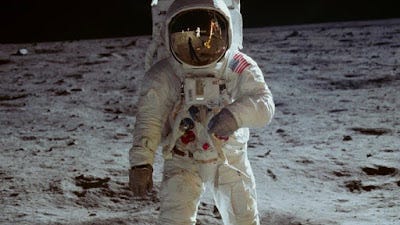
Avengers: Endgame (Joe and Anthony Russo), the pinnacle of Marvel’s unparalleled experiment in interconnected cinematic pulp storytelling, and an incredible emotional pay-off.
Citizen K (Alex Gibney), a great documentary about a Russian oligarch turned notorious Putin critic, through whose eyes we see the descent of post-Soviet Union Russia into a brutal dictatorship – and learn some lessons we should really take to heart to avoid the same here in America.
Doctor Sleep (Mike Flanagan), a wild cinematic high-wire act that manages to be a sequel to Steven King’s original Shining novel, Stanley Kubrick’s iconic Shining film, and an adaptation of King’s follow-up novel of the same name, crafting a pretty great horror film in its own right along the way, with amazing performances from Ewan McGregor and especially Rebecca Ferguson, and deeply impactful themes of overcoming generational trauma.
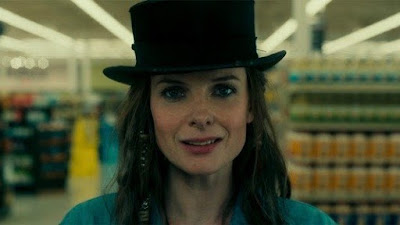
El Camino: A Breaking Bad Movie (Vince Gilligan), the Netflix exclusive sequel to one of the best TV series of the decade, is an impeccably crafted little crime yarn, bringing emotional resolution to Jesse Pinkman’s story and giving Aaron Paul one last chance to inhabit this once-in-a-lifetime character.
Ford v Ferrari (James Mangold), the year’s ultimate ‘dad’ movie, with one of Christian Bale’s best (and cheeriest!) performances and some truly great racetrack sequences.
How to Train Your Dragon: The Hidden World (Dean DeBlois), the conclusion to the best American animated franchise of the 2000s, is less compelling as a stand-alone film than its predecessors, but it sticks the landing so perfectly that you and your tear-filled eyes really won’t care.
Hustlers (Lorene Scafaria), an outstanding crime epic made by, for, and about women, with another great leading performance by Constance Wu and career-best work from an incredible Jennifer Lopez.
Jojo Rabbit (Taika Waititi), a sensitive portrait of a child growing up in an atmosphere of hate, and the wrenching process of seeing light on the other side.
Knives Out (Rian Johnson), perhaps the best genre experiment crafted by Rian Johnson yet, a barn burner of a whodunnit with powerful contemporary resonances and a superb cast, grounded by an incredible Ana de Armas and ignited by Daniel Craig, positively thrilled to be doing his crazy Foghorn Leghorn voice once again.

Missing Link (Chris Butler) another stop-motion winner from the folks at Laika, and another to be sadly overlooked in its theatrical run; it’s basically an Uncharted game with a big, lovable Sasquatch, and I love it to death.
Ne Zha (Jiaozi) became the highest-grossing animated film in Chinese history in a matter of months, and while I don’t know if it’s a ‘great’ movie – it spends too much time chasing lazy Dreamworks-style gross-out humor in the first act – it’s an absolute visual stunner, and a fascinating lens into what it looks like when a culture so different from our own makes a blockbuster in the mold of our family hits.
Once Upon a Time in Hollywood (Quentin Tarantino) is not a film I love on the whole, but it’s a fascinating snapshot of a director being pulled in two very different directions: one a more mature, introspective stylistic evolution, the other a regression into fetishes and hyper-violence. The latter wins out too often, particularly in the final act, for the film to ever congeal into something great, but when you’re watching the former unfold – particularly in all the material involving Leonardo DiCaprio’s aging Western star – there’s real magic to be had.
Ready or Not (Matt Battinelli-Olpin & Tyler Gillett), the rare horror comedy worthy of the label “Sam Raimi-esque,” hitting that sweet spot of becoming a live-action cartoon without sacrificing real tension, thanks in no small part to a fully committed Samara Weaving in the lead role, displaying a penchant for absorbing abuse and spitting out one-liners reminiscent of a young Bruce Campbell.
Rocketman (Dexter Fletcher) is built on a bad script that checks every musical biopic box Walk Hard tore apart way back in 2007, but Fletcher’s direction, particularly in the musical numbers, is so imaginative and skillfully executed, and Taron Edgerton gives a performance of such commitment and enthusiasm – damn, can he sing! – that I’ve only liked it more as time passes.
Shadow (Zhang Yimou), a return to the Wuxia genre for Zhang Yimou after a decade away, this time with one of the decade’s most daring visual palettes – you won’t believe your eyes.

The White Storm 2: Drug Lords (Herman Yau) isn’t necessarily a ‘great’ film, but if you harbor any kind of sweet spot for a good old fashioned Hong Kong crime soap opera (a la Infernal Affairs), this giant slice of insanity will put a big smile on your face.
Toy Story 4 (Josh Cooley) seemed like the year’s most unnecessary sequel, and instead, it’s the best entry yet in Pixar’s marquee franchise, funnier than just about anything else you could pay to see theatrically in 2019, with an ending that goes for thematic fulfillment instead of status quo maintenance, and hits the tear ducts full force as a result.
Follow author Jonathan Lack on Twitter @JonathanLack.
Subscribe to The Weekly Stuff Podcast for more reviews of film, video games, television, and anime.

